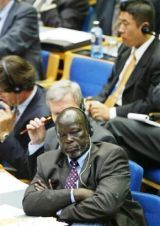Sudan peace deal signed amid Darfur doubts
By Mark Turner and Andrew England
NAIROBI, Kenya, Nov 19, 2004 (Financial Times) — Sudan’s government and southern rebels vowed on Friday to end Africa’s longest civil war by Dec 31, signing a pledge in front of 15 UN Security Council envoys who flew in from New York to demand the fighting stop.

|
|
Sudan People’s Liberation Movement leader John Garang listens to a speech by Sudanese Vice President Ali Osman Taha, not seen, Friday, Nov. 19, 2004 during the U.N Security Council meeting in Nairobi. (AP). |
After the signing ceremony, the Security Council, meeting away from its Manhattan home for the first time in 14 years, unanimously adopted a resolution promising political and economic support once Sudan ended two wars that have left millions dead in the south and in Darfur in the West.
With the council’s ambassadors as witnesses, the Sudanese government and the rebel Sudan People’s Liberation Movement signed a document promising to complete a final accord by Dec 31 to end 21 years of war in the oil-producing but impoverished south of Africa’s biggest country.
US ambassador John Danforth, currently president of the Security Council, acknowledged some believed the council had come to Kenya for two days to deliver grand words while people were dying.
“It’s up to you to prove the naysayers and sceptics wrong,” he told Ali OsmanTaha, Sudanese vice president, and rebel leader John Garang at the council meeting. “The United Nations and all the nations of the world expect – demand – that you deliver on your word.”
Council members said the promise of a comprehensive deal offered the best hope yet for resolving not only Africa’s longest-running civil war, but all of Sudan’s myriad conflicts, including continuing violence in the western Darfur region.
In sharp contrast, aid workers and pressure groups condemned what they saw as an inexcusable lack of action in Darfur, where a separate insurgency is spiraling out of control.
The contrasting positions revealed a fundamental divergence between activists’ demands for immediate punitive action against the government over Darfur, and diplomats’ belief that long-term constructive engagement, backed by sustained attention, offered a more realistic prospect of saving Sudan from disintegration.
According to western diplomats, a comprehensive north-south deal would usher in a new era of political change, going a long way to meeting the aspirations of Sudan’s many marginalised groups for economic and political inclusion.
But aid agencies and human rights’ advocates said the Council’s failure to reiterate a threat of sanctions over Darfur, in a resolution adopted on Friday, constituted a dangerous step backwards. A number are calling for targeted sanctions against government officials, and say they will now turn to the European Union.
“From New York to Nairobi, a trail of weak resolutions on Darfur has led nowhere,” said Caroline Nursey, from Oxfam. Jemera Rone, from Human Rights Watch, warned: “The Sudan government will see this as a letting up in pressure.”
Jan Pronk, the UN’s envoy to Sudan, also believed more urgent action was needed to protect civilians. “In terms of conflict resolution, it is taking it forward. In terms of protection it is not,” he told the FT.
“I’m in a difficult situation because countries are constantly speaking about protection; but I don’t have the resources.”
Western officials retorted that the UN should act more efficiently with the resources it already had. They also said they were sending equipment to back an African Union mission, with limited protection responsibilities, in Darfur.
While no-one saw the north-south agreement as a panacea, western officials believed it marked the beginning of a critical process of regime change, leading to a transitional government of unity, decentralized administration, resource-sharing, and elections after three and a half years.
British officials said the benefits flowing from those arrangements would meet the Darfur insurgents’ concerns just as much as those of the southern rebel movement.
And Mr Danforth stressed the UN had in no way stepped back from its previous warnings. “The violence and atrocities being perpetrated in Darfur must end now,” he said. “You have heard this message clearly from the Security Council – heed it. I cannot emphasize this point more strongly.”
